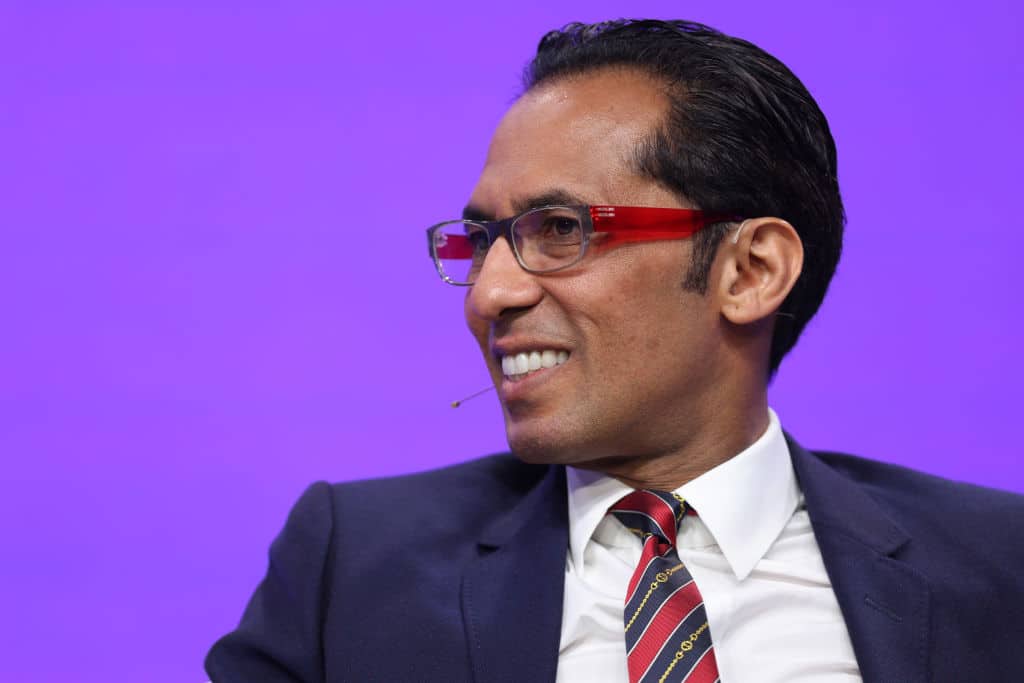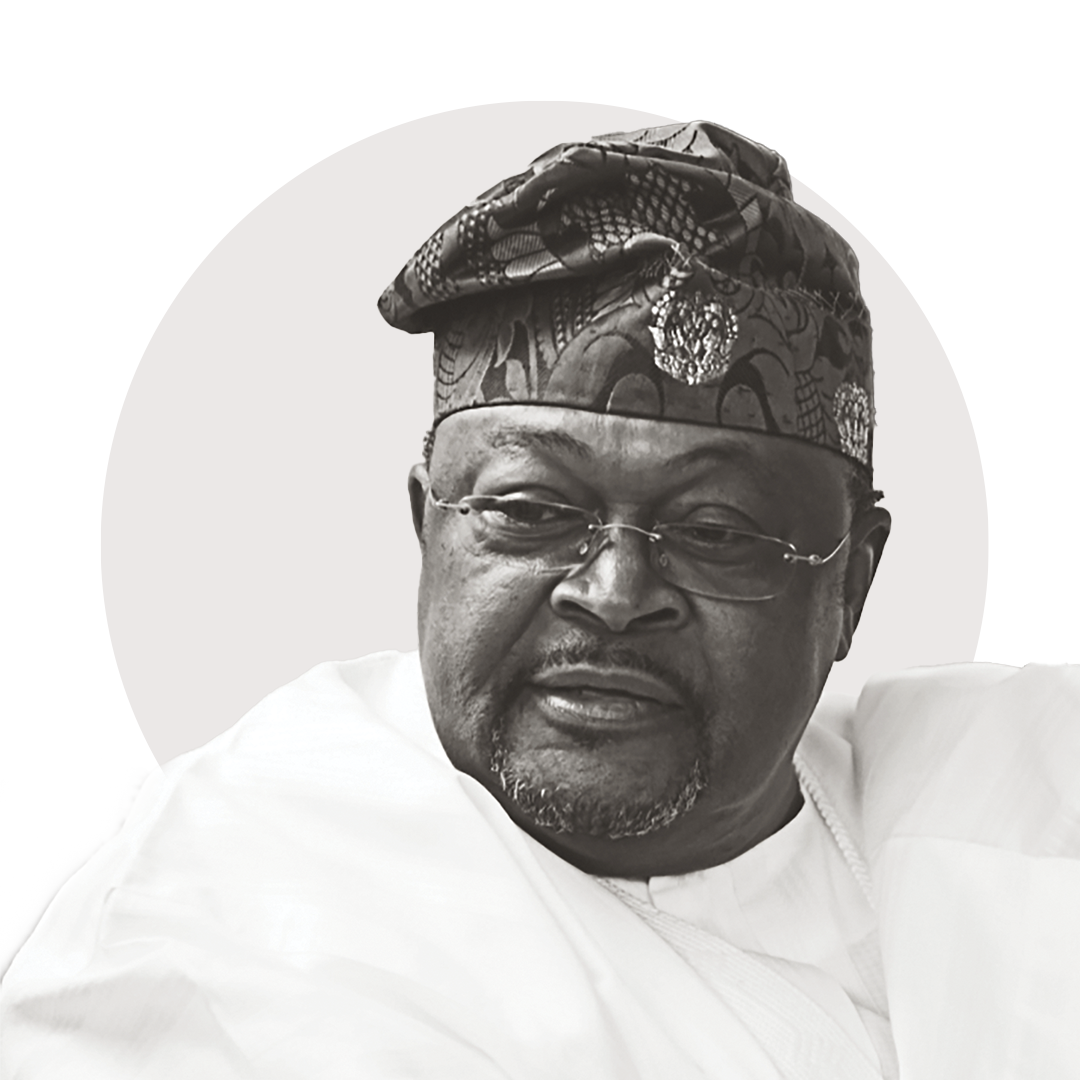Globe-trotting billionaire Mo Dewji made a fortune in East Africa selling palm oil, rope, and soda. Now he claims to have the recipe for transforming Tanzania into an agribusiness powerhouse.
Puffing on a nicotine vape and seated on a white leather chair in his $50 million home in Dubai, Mohammed “Mo” Dewji is waxing poetic about his plans to mechanize farming 2,500 miles away. “I want to make Africa, long term, a food basket for the world,” says the 48-year-old billionaire, who was born, raised and until recently lived in Tanzania. A framed photograph of a street in Zanzibar, the Tanzanian archipelago famous for lush white beaches, hangs on a wall behind him. “Why the hell are we not investing in agri?”
Dewji is well known in Tanzania, Africa’s fifth largest country with a population of 70 million. The football team owner and former politician controls a range of businesses through his consumer goods conglomerate MeTL Group, including textile manufacturing, edible oil refineries and his Mo Cola carbonated beverages line (named after himself). MeTL already grows crops like tea, avocados, and sisal (a natural fiber used in rope), which are vertically integrated into his other businesses.
Now Dewji wants to grow his agribusiness empire – by orders of magnitude. He is seeking to invest $250 million, including $100 million of his own capital, to buy and mechanize 100,000 hectares of farmland in Tanzania. MeTL would use the crops to feed its own businesses, then sell the surpluses to other Tanzanian firms, African countries and even European customers. Dewji says this “vision” came to him in the aftermath of Russia’s invasion of Ukraine as soaring food and fertilizer prices worsened conditions of poverty and malnutrition in Africa.
Agriculture accounts for one-third of Tanzania’s annual GDP (of $75 billion), but roughly 90% of that farming is done by subsistence farmers tilling less than 5 hectares of land each. As a result, food insecurity in Tanzania is widespread: Over 30% of children are stunted, and 13 million Tanzanians live in extreme poverty, while “many others live just above the poverty line,” according to the U.S. Agency for International Development. That’s despite Tanzania being the second biggest receiver of foreign aid in Sub-Saharan Africa (behind only Ethiopia) between 1990 to 2010, receiving $26.85 billion. One of those aid suppliers, the World Bank, acknowledges that Tanzania “still faces stubbornly high levels of poverty, in part as a result of dependence on low productivity agriculture.”
Loading...
Bigger, more efficient farms could help solve Tanzania’s hunger problem. In developing countries, “Larger farms tend to be more efficient than their smaller counterparts,” a recent European Commission paper found. Within Africa, increasing agricultural productivity was “a substantial driver of growth and poverty reduction” in Ethiopia, Ghana, Malawi, Rwanda and Uganda—in contrast to Tanzania and those countries where farming growth lagged, according to a UN study. But agribusiness also comes with costs: human displacement, environmental degradation, disruption of local trading networks upending entire communities. Dewji says the benefits outweigh the cons. “Life goes on for the villagers but [in] a much better scenario,” he says.
Given Dewji’s prominence, any success—or failure—will have a big impact within Tanzania and potentially beyond. “This is larger than Tanzania: a success here could have implications for the continent as a whole,” says Margaret McMillan, an economics professor at Tufts University who studies economic development in East Africa, has lived in Tanzania and heard Dewji make his agribusiness pitch at a recent conference. “If he could use it as a flagship to show how [large-scale farming] can be done successfully, that would be amazing.”
That is Dewji’s long-term plan. He wants to prove his agribusiness model works in Tanzania, then raise money from global investors to replicate it in other African countries. His dream is to invest over $1 billion across 400,000 hectares—about the size of Rhode Island, or 0.3% of Tanzania’s total landmass—across at least three countries, including Zambia and Mozambique. “I spoke to the Zambian president, I spoke to the Mozambique president,” Dewji assured Forbes. “But I said, ‘Guys, let me first work it out in my home country first because I understand the intricacies. Let me show a project for Africa.’”
It’s not clear these dreams will come to fruition. Dewji has been trying to get this operation going for years. Eighteen months ago, he sought four times as much money, $4 billion, to fund an even larger version. He floated the idea of raising money by merging with a special purpose acquisition company and touted potential 10x returns. No partners came calling. “I never raised money because I failed to get the land,” he says.
Dewji has praised Samia Suluhu Hassan, Tanzania’s president since 2021, for promoting more investment and private sector activity. Yet he has spent two years trying to buy 100,000 hectares of Tanzanian land from Hassan’s administration, and the deal isn’t done yet. The land is occupied by villagers and small-scale farmers but is technically owned by Tanzania’s government.
Documents seen by Forbes describe a key pillar of his proposal: cultivating sugar cane and building a sugar refinery on 39,000 hectares in Tanzania’s Rufiji District, a rural region named after Tanzania’s largest river. Some 95,000 people live in the area, scattered across 200 villages and hamlets. MeTL’s acquisition would involve land transfers in 17 villages and the factory would sit on a 860-hectare plot, according to the documents.
Dewji told Forbes that, eventually, he wants to grow grains (wheat, rice, corn), edible oil crops (sunflowers, soybeans, palm), and plant proteins (pigeon peas, yellow gram) on the other 61,000 hectares of land he’d like to acquire.
There have been accusations of land-grabbing, and no wonder. Dewji wants to become Tanzania’s biggest farmer in a single stroke. “Not many people live on the targeted land,” he says, but when asked how many people live there, he declines to say. The village councils and district authorities are on-board with MeTL’s plans, Dewji adds. That hasn’t alleviated concerns about corruption.
“There’s a pretty widespread perception that the government is underhanded in these large-scale transactions, that agreements are not above board,” says Ayala Wineman, a professor of agricultural and food economics at Michigan State University who has researched Tanzania and East Africa. “And oftentimes, it’s with the collaboration of local leaders who benefit from agreeing to hand over land.”
Dewji says that any villagers and subsistence farmers displaced by MeTL will get new land to continue their farming and animal husbandry, that there will be buffer zones between his operations and their new tracts, and that MeTL will fund new roads, hospitals, schools and running water systems. The documents seen by Forbes promise all that and more, including annual dividends paid to local coffers and giveaways like new tractors. “MeTL has been extremely sensitive,” says Dewji, who calls it a “win-win” proposition.
He’ll need to defy recent history, then. A research paper published last year analyzed four separate large-scale land purchases in Tanzania for the purposes of agribusiness. It found that the takeovers “exacerbate farmland inequality in nearby villages” and caused “resulting inequalities [that] are not offset by improvements in other dimensions of well-being.” These local populations are “not really benefiting from these projects in any meaningful way, be it employment, the adoption of new farming practices, improvement in food security, [or] incomes,” says Jonathan Sullivan, the study’s lead author and a professor of sustainability at the University of Arizona. “Maybe Mohammed Dewji is going to do something different, but I imagine it’s going to be pretty similar.”
And yet—Tanzania needs more food. Mechanized farming of staple goods like grains and proteins – as Dewji has proposed – could help feed hungry mouths through sheer economies of scale, improved efficiencies and surpluses. “In rural Tanzania, there is a lot of food acquired through purchase,” explains Wineman. “Subsistence farmers also engage with the market to access the food they need.”
If MeTL exports crops to other countries, as Dewji envisions, Tanzania’s budget will see some of that money. “Presumably, it could generate tax revenue for the government and foreign exchange earnings,” says McMillan, hitting on two key structural issues with Tanzania’s economy: its annual trade deficits and shrinking foreign exchange reserves. Above all, perhaps, private capital should get the chance to succeed where foreign aid has failed. One consultant for the World Bank, who spoke with Forbes on the condition of anonymity, described the bank’s loans and investments in Tanzania (which total $8.3 billion) as “moderately helpful at best.”
If anyone could pull off such an audacious venture, it’s probably Dewji, a man steeped in global ambition and daring, at times dangerous entrepreneurship. His great grandfather, born in Gujarat, India, was one of thousands of Indian Muslims who migrated to East Africa in the 1800s. His father started MeTL in the 1970s as a commodities trading firm. Dewji studied political science at Georgetown and after a brief stint on Wall Street, returned to Tanzania in 1999 to help run the family business. He grew MeTL through a series of deals in the 2000s as Tanzania privatized loss-making state-owned enterprises. He served in his country’s parliament for a decade, between 2005 to 2015—while simultaneously running MeTL. He owns a 49% stake in Simba S.C., a professional football club in Dar Es Salaam, Tanzania’s largest city. He frequently posts photos of himself at matches to his 4.4 million followers.
But what Dewji is most famous for is being kidnapped in October 2018 by a group of armed men in Tanzania’s largest city, Dar es Salaam. The assailants kept Dewji for 10 days and demanded ransom, but in a strange twist, they released him in an abandoned field without ever receiving any payment, and no assailants were ever found guilty in a Tanzanian court of any criminal charges.
Who was behind this odd sequence of events? Two well-placed individuals told Forbes it was widely rumored that Tanzania’s then-President John Magufuli had orchestrated the kidnapping in connection to a dispute with Dewji about MeTL’s massive sisal holdings (sisal is a fibrous plant used to make rope, carpet, shoes and paper). Dewji told Forbes that the kidnapping was “’politically motivated,” but did not provide further detail, other than that he never paid a ransom. “There’s parts of the puzzle I cannot speak about,” he said in a recent podcast interview about the kidnapping, calling the whole event “a paradox.”
Dewji attributes his good fortune to the prayers of ordinary Tanzanians, like those who buy Mo Cola in Dar es Salaam, or those who till the land that he hopes to buy one day. “The poor of the poorest people were praying for me,” Dewji says. “I’ll tell you something: I am indebted to Tanzanians, to Africans.”
Loading...





















